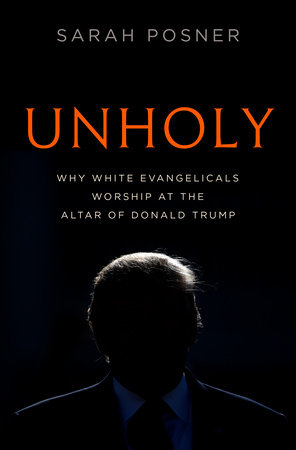By Sarah Posner
|
Editor’s Note: Today we are pleased to run an excerpt from Sarah Posner’s new book, Unholy: Why White Evangelicals Worship at the Altar of Donald Trump. Copyright 2020. Reprinted with permission of Random House. The facile explanation for the apparently improbable union between the proponents of “faith,” “values,” and “family” and the profoundly impious real estate huckster and serial philanderer is that the Christian right hypocritically sacrificed its principles in exchange for raw political power. But this purely transactional explanation for the Trump-evangelical merger elides the deeper bond between Trump and his devoted flock. |
 |
Although Trump is illiterate in evangelicals’ lexicon and spent his adult life flagrantly contravening their sexual mores, his evangelical supporters are nonetheless starstruck. He may not be one of them, but they idolize how he loudly and fearlessly articulates their shared grievances – that alien anti-Christian, anti-American ideologies have taken over the government, judiciary, media, education, and even popular culture and forced edicts upon a besieged white Christian majority, cowing them into submission by invoking “political correctness” that aims to censor, silence, and oppress them.
The Trump-evangelical relationship represents an intense meeting of the minds, decades in the making, on the notion that America lies in ruins after the sweep of historic changes since the mid-twentieth century, promising nondiscrimination and equal rights for those who had been historically disenfranchised – women, racial minorities, immigrants, refugees, and LGBTQ people – eroded the dominance of conservative white Christianity in American public life. Trump apparently has not cracked the binding on the Bible he waves in the air while speaking to evangelical audiences, but he fluently speaks the language of conservative white Christian backlash against the expansion of rights for previously disenfranchised and marginalized Americans. Trump not only gives voice to the Christian right’s perceived loss of religious dominance; he pounds away at grievances over white people losing ground to black and brown people and immigrants, of men losing ground to women, of “originalist” judges under the sway of liberal intruders demanding “special” rights. Trump reassures white evangelical voters that he will restore the America they believe has been lost – the “Christian nation” that God intended America to be, governed by what they claim is “biblical law” or a “Christian worldview.”
The evangelical adoration for Trump is rooted in far more than his willingness to keep a coveted list of campaign promises, like appointing anti-abortion judges or expanding religious exemptions for conservative Christians, such as bakers who refuse to make a cake for a gay wedding. Trump inspires this high regard because he is eager to use strongman tactics in order to carry out those promises. For decades, the Christian right has successfully used the mechanisms of democracy, such as voter registration and mobilization, citizen lobbying, and energetic recruitment of religious candidates to run for office, to advance its agenda. In these efforts, conservative evangelicals are driven not by a commitment to liberal democracy but rather by a politicized theology demanding that they seize control of government to protect it from the demonic influences of liberalism and secularism. Previous presidents pandered to evangelicals, but Donald Trump constitutes the culmination of a movement that has for decades searched for a leader willing to join forces in this battle without cowering to shifting political winds. In Trump, the Christian right sees more than a politician who delivers on promises; they see a savior from the excesses of liberalism.
Although white evangelicals constitute far from a majority of Americans, the president’s bottomless support for them has enabled the Christian right to dictate administration policy, creating a tyranny of the minority that they see as a divine assignment and a last chance to save America. Trump’s white evangelical supporters, then, have chosen to see him not as a sinner but as a strongman, not as a con man but as a king who is courageously unshackling them from what they portray as liberal oppression.
That means that dissenters – including their own evangelical brothers and sisters – are demeaned, dismissed, and ostracized for their insufficient loyalty to Trump, the pagan king. Longtime evangelical insiders who raise objections to Trump’s candidacy, or who question their brethren’s eventual genuflection to him, have been cast aside by powerful players in the pro-Trump evangelical world, left struggling to understand exactly what has happened to a community that was once their spiritual, cultural, and political home.
Midway through Trump’s first term, one of his most enthusiastic evangelical backers, Robert Jeffress, pastor of First Baptist, a Dallas megachurch, called anti-Trump evangelicals “spineless morons” on Fox News personality Todd Starnes’s radio program. By that time, such disdain for Trump’s evangelical detractors had become so entrenched that Jeffress’s insult was barely noticed as anything unusual.
(Banner photo: Screenshot of President Trump waving a Bible in front of St. John’s Episcopal Church from C-SPAN)


